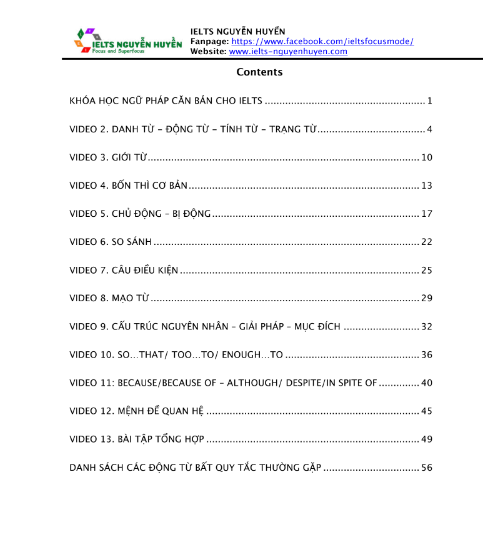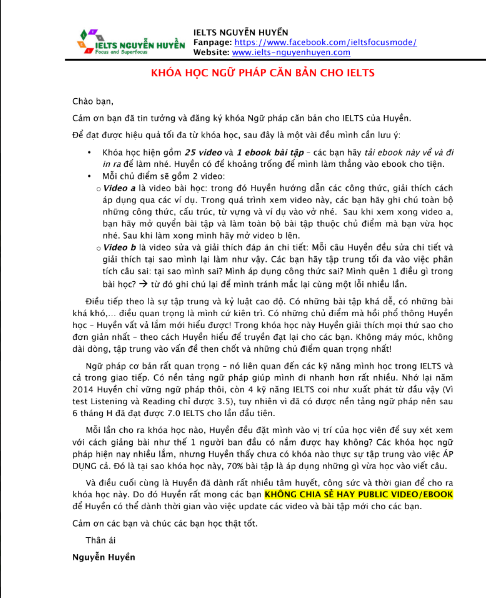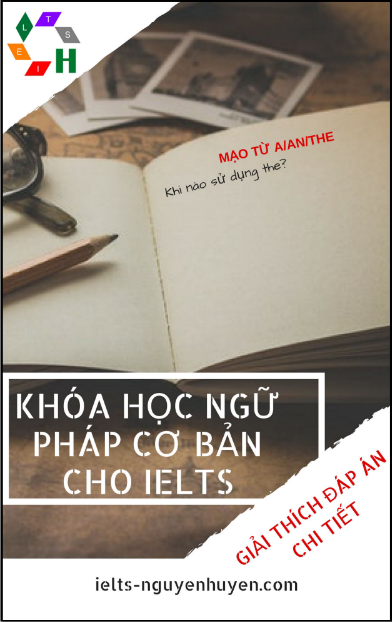


Chào bạn, Cảm ơn bạn đã tin tưởng và đăng ký khóa Ngữ pháp căn bản cho IELTS của Huyền. Để đạt được hiệu quả tối đa từ khóa học, sau đây là vài điều mình cần lưu ý:
* Khóa học hiện gồm 25 video và 1 ebook bài tập – các bạn hãy tải ebook này về và đi in ra để làm nhé. Huyền có để khoảng trống để mình làm thẳng vào ebook cho tiện.
* Mỗi chủ điểm sẽ gồm 2 video:
* Video a là video bài học: trong đó Huyền hướng dẫn các công thức, giải thích cách áp dụng qua các ví dụ. Trong quá trình xem video này, các bạn hãy ghi chú toàn bộ những công thức, cấu trúc, từ vựng và ví dụ vào vở nhé. Sau khi xem xong video a, bạn hãy mở quyển bài tập và làm toàn bộ bài tập thuộc chủ điểm mà bạn vừa học nhé. Sau khi làm xong mình hãy mở video b lên.
* Video b là video sửa và giải thích đáp án chi tiết: Mỗi câu Huyền đều sửa chi tiết và giải thích tại sao mình lại làm như vậy. Các bạn hãy tập trung tối đa vào việc phân tích câu sai: tại sao mình sai? Mình áp dụng công thức sai? Mình quên 1 điều gì trong bài học?! Từ đó ghi chú lại để mình tránh mắc phải cùng một lỗi nhiều lần. Điều tiếp theo là sự tập trung và kỷ luật cao độ. Có những bài tập khá dễ, có những bài khá khó,… điều quan trọng là mình cứ kiên trì. Có những chủ điểm mà hồi phổ thông Huyền học – Huyền vất vả lắm mới hiểu được! Trong khóa học này Huyền giải thích mọi thứ sao cho đơn giản nhất – theo cách Huyền hiểu để truyền đạt lại cho các bạn.
Không máy móc, không dài dòng, tập trung vào vấn đề then chốt và những chủ điểm quan trọng nhất! Ngữ pháp cơ bản rất quan trọng – nó liên quan đến các kỹ năng mình học trong IELTS và cả trong giao tiếp. Có nền tảng ngữ pháp giúp mình đi nhanh hơn rất nhiều. Nhớ lại năm 2014 Huyền chỉ vững ngữ pháp thôi, còn 4 kỹ năng IELTS coi như xuất phát từ đầu vậy (Vì test Listening và Reading chỉ được 3.5), tuy nhiên vì đã có được nền tảng ngữ pháp nên sau 6 tháng H đã đạt được 7.0 IELTS cho lần đầu tiên. Mỗi lần cho ra khóa học nào, Huyền đều đặt mình vào vị trí của học viên để suy xét xem với cách giảng bài như thế 1 người ban đầu có nắm được hay không? Các khóa học ngữ pháp hiện nay nhiều lắm, nhưng Huyền thấy chưa có khóa nào thực sự tập trung vào việc ÁP DỤNG cả. Đó là tại sao khóa học này, 70% bài tập là áp dụng những gì vừa học vào viết câu. Và điều cuối cùng là Huyền đã dành rất nhiều tâm huyết, công sức và thời gian để cho ra khóa học này. Do đó Huyền rất mong các bạn KHÔNG CHIA SẺ HAY PUBLIC VIDEO/EBOOK để Huyền có thể dành thời gian vào việc update các video và bài tập mới cho các bạn. Cảm ơn các bạn và chúc các bạn học thật tốt.
2. Each sentence below contains one error. Identify the error and correct it.
1. I think this is great **news**. (News is an uncountable noun and does not take the plural marker -s. It is always singular.) Correction: I think this is great **news**.
2. They bought too much **furniture** and I think it was a waste of money. (Furniture is an uncountable noun, so ‘much’ should be used instead of ‘many’.) Correction: They bought too **much** furniture and I think it was a waste of money.
3. There were so many reasons why they said little about themselves. (Reasons is a countable noun, so ‘many’ should be used instead of ‘much’.) Correction: There were so **many** reasons why they said little about themselves.
4. The **amount** of time they spent sleeping per night increased steadily from 6 hours to 9 hours. (Time is an uncountable noun, so ‘amount’ should be used instead of ‘number’.) Correction: The **amount** of time they spent sleeping per night increased steadily from 6 hours to 9 hours.
5. They checked two **people** at a time. (Person is singular; when referring to more than one, use ‘people’.) Correction: They checked two **people** at a time.
6. I do not have much **time**. (Time is an uncountable noun, so ‘much’ should be used instead of ‘many’.) Correction: I do not have much **time**.
7. The **amount** of books that they borrowed from the local library rose significantly during the period shown. (Books are countable, but the sentence refers to a quantity rather than individual items being counted, making ‘amount’ potentially acceptable in some contexts, but ‘number’ is generally preferred for countable items. However, if the intention is to refer to the total quantity as a singular concept, ‘amount’ might be used colloquially. The most standard correction for countable items is ‘number’. Given the context and the phrasing, ‘number’ is the most appropriate choice.) Correction: The **number** of books that they borrowed from the local library rose significantly during the period shown.
8. I love **dogs** because they are very cute. (When making a general statement about a species, the plural form is typically used.) Correction: I love **dogs** because they are very cute.
9. Last night she drank too much **alcohol**, but she didn’t talk much about her ex-boyfriend. (Alcohol is an uncountable noun, so ‘much’ should be used instead of ‘many’.) Correction: Last night she drank too **much** alcohol but she didn’t talk much about her ex-boyfriend.
10. There are many rooms in my house and each room has a lot of **equipment**. (Equipment is an uncountable noun, so ‘equipment’ should be used instead of ‘equipments’.) Correction: There are many rooms in my house and each room has a lot of **equipment**.
1. Sự phát triển của trẻ (sự phát triển: development) **The development of children**
2. Căn nhà của chị tôi **My sister’s house**
3. Sự tăng trưởng của các thành phố lớn (sự tăng trưởng: growth) **The growth of big cities**
4. Mái nhà của tòa nhà kia (mái nhà: roof, tòa nhà: building) **The roof of that building**
5. Buổi họp ngày mai (buổi họp: meeting, ngày mai: tomorrow) **Tomorrow’s meeting**
6. Quyển sách của bạn cô ấy **Her friend’s book**
7. Những người bạn của ba tôi **My father’s friends**
8. Những lỗi lầm của cha cậu ấy (lỗi lầm: fault) **His father’s faults**
9. Sự mở rộng của tuyến đường bộ (Sự mở rộng: expansion, tuyến đường bộ: road) **The expansion of the road**
10. Những sự kiện của năm nay (sự kiện: event) **This year’s events**
ĐỘNG TỪ
4. Each sentence below contains one error. Identify the error and correct it. 1. He decided **to go** to that college and **study** History. (The infinitive ‘to go’ follows ‘decided’. For parallel structure after ‘and’, the infinitive without ‘to’ is used if the first verb is ‘decided to’ and the second verb is also an action that is decided upon.) Correction: He decided **to go** to that college and **study** History. 2. I want to know why you promised **to do** that. (‘to do’ is the infinitive form that follows ‘promised’.) Correction: I want to know why you promised **to do** that. 3. You need to spend more time **taking care** of him. (‘taking care’ is the gerund form that follows ‘spend time’.) Correction: You need to spend more time **taking care** of him. 4. She enjoys **listening** to music in her spare time. (‘listening’ is the gerund form that follows ‘enjoys’.) Correction: She enjoys **listening** to music in her spare time. 5. I have a lot of difficulties **learning** English but I will try my best. (‘learning’ is the gerund form that follows ‘difficulties’.) Correction: I have a lot of difficulties **learning** English but I will try my best. 6. The local government considered **changing** the plan. (‘changing’ is the gerund form that follows ‘considered’.) Correction: The local government considered **changing** the plan. 7. They are busy **doing** their homework. (‘doing’ is the gerund form that follows ‘busy’.) Correction: They are busy **doing** their homework. 8. He often practices **speaking** English with his friends. (‘speaking’ is the gerund form that follows ‘practices’.) Correction: He often practices **speaking** English with his friends. 9. I’m a workaholic person, I’m used to **working** long hours. (‘working’ is the gerund form that follows ‘used to’ when it means accustomed to.) Correction: I’m a workaholic person, I’m used to **working** long hours. 10. She didn’t have much time but she managed **to go** to the gym twice a week. (‘to go’ is the infinitive form that follows ‘managed’.) Correction: She didn’t have much time but she managed **to go** to the gym twice a week.
Rewrite the sentences completely: conjugate the verbs and add necessary prepositions.
1. She enjoys going out with her friends, but sometimes she just wants to be alone.
2. We tend to eat too much fast food, and I think we need to change our eating habits if we want to live longer.
3. He enjoys hanging out with his friends, but now he is busy preparing for his exam, so he has to stay home.
Có thể bạn cũng muốn đọc thêm các cuốn sách tiếng Anh sau:
4. They have a lot of difficulties dealing with their new clients.
5. Children these days spend a lot of time watching TV and playing video games.
6. Nowadays, parents are too busy with their work, so they do not have much time for their kids.
7. You do not need to risk doing that.
8. You should avoid making the same mistakes.
9. The earth’s temperatures keep increasing at an alarming rate.
10. Women tend to spend a large amount of money buying clothes and beauty products. 6. Choose the appropriate word class. 1. She is so beautiful and she also sings very well. I think he is a good learner. He speaks English very well. 2. Helen ran quickly and fell into a hole. Thanks to her quick action, she could get out of it easily. 3. Oil prices have increased significantly during the past few years. 4. These people would make significant contributions to our company. 5. This will negatively affect the development of any nations. This has a negative effect on the development of any nations. 6. Can I stay up late tonight? She’s developed some very strange habits lately. 7. He works very hard because he wants to get promoted. I hardly ever listen to rock music. 8. You should make healthy food choices if you want to live longer. 9. From 1990 to 1992, China saw a steady increase in its crime rates, while the figure for the US dropped steadily. 7. Translate the following sentences into English, changing the word class of the given words if necessary.
1. Bạn nên suy nghĩ kỹ càng hơn trước khi đưa ra quyết định. think(v): suy nghĩ careful (adj): kỹ càng make a decision: đưa ra quyết định You should think more carefully before making a decision.
2. Tỷ lệ thất nghiệp ở Anh giảm nhanh chóng từ 2000 đến 2005. unemployment(n): thất nghiệp rate(n): tỷ lệ decrease(v): giảm quick(adj): nhanh chóng The unemployment rate in Britain decreased quickly from 2000 to 2005.
3. Điều này có thể có những hậu quả nghiêm trọng cho lĩnh vực này. cause(v): gây ra consequence(n): hậu quả serious(adj): nghiêm trọng field(n): lĩnh vực This could cause serious consequences for this field.
4. Điều này có thể giúp bạn đưa ra những quyết định khôn ngoan. wise(adj): khôn ngoan This can help you make wise decisions.
5. Thất nghiệp ảnh hưởng tiêu cực đến sự tăng trưởng kinh tế của Việt Nam. negative(adj): tiêu cực effect(n): ảnh hưởng economic growth: sự tăng trưởng kinh tế Unemployment negatively affects Vietnam’s economic growth. 6. Những học sinh này học cách suy nghĩ 1 cách tự lập và làm việc hiệu quả trong 1 môi trường áp lực cao. independent(adj): tự lập effective(adj): hiệu quả environment(n): môi trường high-pressure(adj): áp lực cao These students learn to think independently and work effectively in a high-pressure environment. 7. Khả năng lãnh đạo là 1 trong những kỹ năng quan trọng nhất trong thế giới ngày nay. leadership(n): khả năng lĩnh đạo skill(n): kỹ năng important(adj): quan trọng today’s world: thế giới ngày nay Leadership is one of the most important skills in today’s world. 8. Từ 1990 tới 1991, số người sử dụng xe hơi tăng chậm. car user: người sử dụng xe hơi increase(v): tăng slow(adj): chậm From 1990 to 1991, the number of car users increased slowly. 9. Điều này có thể ảnh hưởng đến những mối quan hệ cá nhân của tôi. affect(v): ảnh hưởng đến personal relationship: mối quan hệ cá nhân This could affect my personal relationships. 10. Anh ta là 1 người may mắn. lucky(adj): may mắn He is a lucky person. 8. Choose the appropriate word class.
1. We quickly got bored with that film. It was so boring.
2. Working long hours makes me feel tired and exhausted.
3. She loves her job because she thinks it is a satisfying job.
4. I was disappointed by the quality of the wine.
5. The instructions on the box are very confusing.
6. I’m really interested in pop music. It always makes me feel relaxed.
7. I often listen to You raise my up whenever I feel depressed.
8. The children were excited about opening their presents.
9. We face undoubted difficulties, but also some exciting possibilities.
10. Shopping can be very tiring.
BÀI TẬP TỔNG HỢP
9. Translate the following sentences into English. Change the word class of the given words if necessary.
1. Các mẩu quảng cáo cung cấp cho khách hàng nhiều thông tin về sản phẩm và dịch vụ. advertisement(n): quảng cáo provide(v): cung cấp customer(n): khách hàng information(n): thông tin product(n): sản phẩm service(n): dịch vụ Advertisements provide customers with a lot of information about products and services.
2. Kết quả là, họ có thể chọn lựa những sản phẩm tốt nhất với giá cả hợp lý. as a result: kết quả là choose (v): chọn lựa price (n): giá cả reasonable (adj): hợp lý As a result, they can choose the best products at reasonable prices.
3. Ngày nay, trẻ em có xu hướng tiêu thụ quá nhiều thức ăn nhanh và nước ngọt. These days: ngày nay tend (v): có xu hướng consume (v): tiêu thụ fast food: thức ăn nhanh soft drink: nước ngọt These days, children tend to consume too much fast food and soft drinks.
4. Hậu quả là, chúng trở nên thừa cân và mắc nhiều vấn đề về sức khỏe. as a result: hậu quả là overweight (adj): thừa cân suffer from various health problems: mắc nhiều vấn đề về sức khỏe As a result, they become overweight and suffer from various health problems.
5. Ô nhiễm không khí ảnh hưởng nghiêm trọng tới sức khỏe của con người. air pollution: ô nhiễm không khí affect (v): ảnh hưởng serious (adj): nghiêm trọng health(n): sức khỏe Air pollution seriously affects people’s health.
6. Ngày nay, cha mẹ rất bận rộn với công việc của họ nên họ không có nhiều thời gian cho con cái của họ. busy (adj): bận rộn children(n): con cái Nowadays, parents are very busy with their work, so they do not have much time for their children.
Các sách tiếng anh khác cùng chủ đề:



